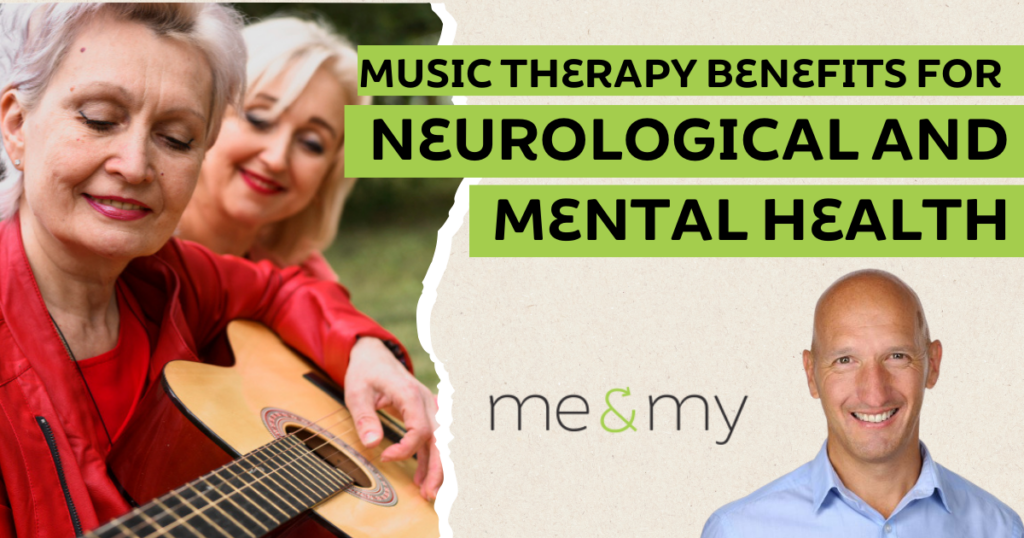Power of Music Therapy: A Holistic Approach to Mental and Neurological Health

Can the simple act of listening to a melody or humming a tune significantly enhance mental and neurological health? Music therapy, a transformative branch of holistic healthcare, suggests a resounding yes. This therapeutic approach is not just about enjoying music but strategically using it to combat and manage a spectrum of psychological and neurological challenges.
This blog delves into the profound benefits of music therapy, inspired by the enlightening discussions on the me&my health up podcast hosted by Anthony Hartcher with esteemed guest Dr. Tanya Silveira.
Together, they explore how tailored musical interventions can effectively address conditions ranging from anxiety and depression to Alzheimer’s, dementia, Parkinson’s, and stroke recovery.
Watch full video of the podcast here:
What is Music Therapy?
Music therapy is a specialised practice where music is employed to address the physical, emotional, cognitive, and social needs of individuals. By engaging with elements such as rhythm, melody, and harmony, music therapists facilitate therapeutic interventions that contribute to overall health and well-being.
This form of therapy extends beyond traditional methods by offering a creative and often more engaging avenue for expression and communication, especially beneficial for those who find verbal communication challenging.
Neurological Benefits of Music Therapy

The capacity of music to engage both hemispheres of the brain makes music therapy uniquely effective for neurological disorders. It facilitates significant recovery improvements by stimulating brain areas responsible for critical functions such as movement and speech:
- Stroke Recovery: Music therapy aids in rewiring the brain post-stroke by activating alternative neural pathways, enhancing motor recovery and speech rehabilitation.
- Parkinson’s Disease: Patients suffering from Parkinson’s experience improved motor control and coordination through rhythmic cues provided by music therapy, facilitating smoother movements and better quality of life.
- Dementia and Alzheimer’s: For those with dementia or Alzheimer’s, music therapy can trigger memory recall by utilising familiar songs, thus providing a bridge back to lost memories and improving patient interaction.
Psychological Advantages of Music Therapy

In the realm of mental health, music therapy offers a powerful tool for managing conditions like anxiety and depression. It provides a non-verbal outlet for individuals to express their emotions, which can be crucial for those who struggle to articulate their feelings:
- Emotional Resilience: Through active engagement in creating music, individuals can explore and process their emotions, building resilience and offering a therapeutic release from stress and anxiety.
- Enhanced Self-expression: Music therapy provides a unique platform for self-expression and interpersonal interaction, empowering those who may feel marginalized or misunderstood by conventional therapeutic practices.
Innovative Approaches to Music Therapy

Music therapists are continually innovating to expand the applicability of their practice. Techniques such as improvisational music therapy, where patients express themselves through spontaneous musical creation, play a pivotal role in psychological healing.
This technique supports emotional exploration and healing, providing a safe space for patients to navigate their emotional landscapes.
Music Therapy in Practice: Real-world Applications
- Case Studies: Numerous case studies highlight the effectiveness of music therapy across different conditions. For instance, individuals recovering from stroke have shown remarkable improvements in mobility and speech, while those with Parkinson’s report better rhythm in movements and reduced stiffness.
- Group Sessions: Music therapy is not limited to individual sessions. Group music therapy offers additional benefits by fostering social interactions and community support, which are vital for mental health.
Accessibility and Implementation

With advancements in digital health, music therapy has become more accessible to individuals in remote or underserved locations. This adaptation to telehealth platforms has ensured that therapy can continue uninterrupted, regardless of physical constraints, ensuring that those who benefit from music therapy continue their treatment in any circumstances.
Conclusion
Music therapy is a dynamic and versatile intervention suited to treating a wide array of health conditions. Its ability to connect and heal on a deeply personal level makes it a crucial addition to modern therapeutic practices.
Whether addressing severe neurological damage or managing chronic mental health conditions, music therapy offers a compassionate and effective treatment pathway, harmonising the body and mind through the power of music.
Enhance Your Wellness Journey with me&my wellness
At me&my wellness, we believe in the power of holistic health coaching tailored to your unique health and wellness goals. Understanding the impact of therapies like music therapy on overall well-being, we integrate a variety of holistic approaches to support your journey.
Ready to take the next step towards a healthier, more fulfilled life? Book a 15-minute FREE consultation with us today and discover how our personalised coaching can transform your approach to health and wellness.

